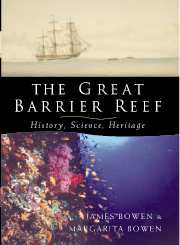Book contents
- Frontmatter
- Contents
- Abbreviations and Acronyms
- Preface
- Acknowledgments
- Introduction: An Overview
- Part One NAVIGATORS AND NATURALISTS IN THE AGE OF SAIL
- Part Two A NEW ERA IN REEF AWARENESS: FROM EARLY SCIENTIFIC INVESTIGATION TO CONSERVATION AND HERITAGE
- Chapter 11 ORIGIN AND STRUCTURE OF CORAL REEFS: FROM FORSTER TO DARWIN
- Chapter 12 DARWIN'S LEGACY: CORAL REEF CONTROVERSY 1863–1923
- Chapter 13 EXPLOITATION CHALLENGED: RISE OF ECOLOGY
- Chapter 14 REEF RESEARCH AND CONTROVERSY: 1920–1930
- Chapter 15 THE LOW ISLES EXPEDITION, 1928–1929: PLANNING AND PREPARATION
- Chapter 16 BIOLOGICAL RESEARCH OF THE LOW ISLES EXPEDITION
- Chapter 17 FROM DEPRESSION TO WAR: TOURISM, CONSERVATION AND SCIENCE, 1929–1939
- Chapter 18 THE PACIFIC WAR AND ITS AFTERMATH
- Chapter 19 A NEW PROBLEM: THE CONSERVATION CONTROVERSY, 1958–1972
- Chapter 20 CRISIS RESOLUTION: FORMATION OF AN ENVIRONMENTAL MANAGEMENT AUTHORITY
- Chapter 21 A NEW ERA: RESEARCH BASED MANAGEMENT
- Chapter 22 THE REEF UNDER PRESSURE: RESEARCH AND MANAGEMENT
- Chapter 23 THE REEF AS HERITAGE: A CHALLENGE FOR THE FUTURE
- References
- Index
Chapter 21 - A NEW ERA: RESEARCH BASED MANAGEMENT
from Part Two - A NEW ERA IN REEF AWARENESS: FROM EARLY SCIENTIFIC INVESTIGATION TO CONSERVATION AND HERITAGE
Published online by Cambridge University Press: 22 September 2009
- Frontmatter
- Contents
- Abbreviations and Acronyms
- Preface
- Acknowledgments
- Introduction: An Overview
- Part One NAVIGATORS AND NATURALISTS IN THE AGE OF SAIL
- Part Two A NEW ERA IN REEF AWARENESS: FROM EARLY SCIENTIFIC INVESTIGATION TO CONSERVATION AND HERITAGE
- Chapter 11 ORIGIN AND STRUCTURE OF CORAL REEFS: FROM FORSTER TO DARWIN
- Chapter 12 DARWIN'S LEGACY: CORAL REEF CONTROVERSY 1863–1923
- Chapter 13 EXPLOITATION CHALLENGED: RISE OF ECOLOGY
- Chapter 14 REEF RESEARCH AND CONTROVERSY: 1920–1930
- Chapter 15 THE LOW ISLES EXPEDITION, 1928–1929: PLANNING AND PREPARATION
- Chapter 16 BIOLOGICAL RESEARCH OF THE LOW ISLES EXPEDITION
- Chapter 17 FROM DEPRESSION TO WAR: TOURISM, CONSERVATION AND SCIENCE, 1929–1939
- Chapter 18 THE PACIFIC WAR AND ITS AFTERMATH
- Chapter 19 A NEW PROBLEM: THE CONSERVATION CONTROVERSY, 1958–1972
- Chapter 20 CRISIS RESOLUTION: FORMATION OF AN ENVIRONMENTAL MANAGEMENT AUTHORITY
- Chapter 21 A NEW ERA: RESEARCH BASED MANAGEMENT
- Chapter 22 THE REEF UNDER PRESSURE: RESEARCH AND MANAGEMENT
- Chapter 23 THE REEF AS HERITAGE: A CHALLENGE FOR THE FUTURE
- References
- Index
Summary
REEF RESEARCH: JAMES COOK UNIVERSITY AND THE AUSTRALIAN INSTITUTE OF MARINE SCIENCE
Throughout the years of political confrontation between the Commonwealth and Queensland over the future of the Great Barrier Reef, the need for serious, institutionalised research had already been demanded for more than a decade by Queensland Senator Felix Dittmer, previously a marine science collector for museums. In his maiden speech of 27 August 1959 Dittmer had argued the case for more Commonwealth involvement in north Queensland, including ‘the establishment of a large marine biological site on the Barrier Reef’ (Senate Parliamentary Debates, 8 Eliz.II, V.S15, 354). Maintaining pressure throughout the following years, in the Senate Estimates Debate of September 1963 Dittmer questioned John Gorton, at the time Minister for Science, about allocation of funds for the much neglected area of marine research, asserting, in the flow of argument, that it was in need of considerable upgrading. ‘I believe’, he stressed,
there is justification for the establishment in Australia of a marine biological research station. Off the Queensland coast is a formation which is unique. I refer to the Great Barrier Reef. By failing to explore the possibilities of the Great Barrier Reef we have not done justice to the scientific world … No tribute has been paid to this unique natural structure.
- Type
- Chapter
- Information
- The Great Barrier ReefHistory, Science, Heritage, pp. 357 - 378Publisher: Cambridge University PressPrint publication year: 2002



